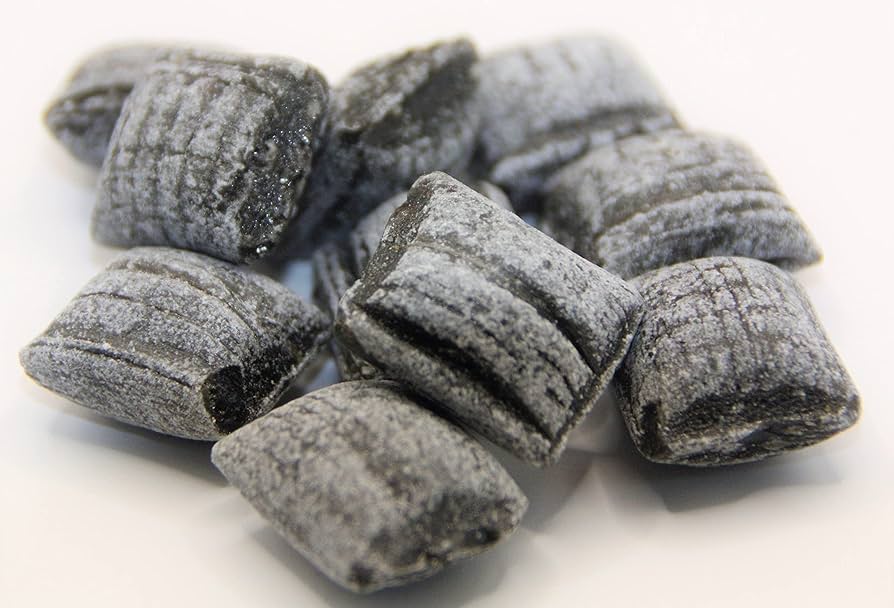Licorice: Sweet, Soothing, and Medicinal
Licorice is a plant with a long history of use in traditional medicine. Its roots and extracts have been used to treat a variety of ailments, including coughs, sore throats, and digestive problems. Licorice is also known for its sweet flavor, which is often used to flavor candy, tobacco, and other products.
In recent years, research has shown that licorice may have a number of health benefits. It has been shown to reduce inflammation, lower blood pressure, and improve liver function. Licorice may also help to protect against cancer and heart disease.

Despite its benefits, licorice can also have side effects if consumed in large amounts. It can cause high blood pressure, water retention, and heart palpitations. It can also interact with certain medications, so it is important to talk to your doctor before taking licorice supplements.
licorice is a safe and effective herb that can provide a number of health benefits. However, it is important to use it in moderation and to talk to your doctor before taking licorice supplements.

The History of Licorice
The History of Licorice
Licorice has been used for centuries as a traditional medicine. It is thought to have originated in China, where it has been used for over 5,000 years. The root of the licorice plant is used to make a variety of products, including tea, candy, and medicine.
Licorice has a number of medicinal properties. It is a powerful antioxidant, and it has been shown to help with a variety of conditions, including coughs, sore throats, and digestive problems. Licorice also has anti-inflammatory properties, and it can help to reduce pain and swelling.
In addition to its medicinal properties, licorice is also a popular ingredient in candy and other sweet treats. It has a sweet, slightly salty flavor that is enjoyed by many people.
Table of Contents
- History of Licorice
- Medicinal Properties of Licorice
- Uses of Licorice
- Side Effects of Licorice
- References
The Medicinal Benefits of Licorice
The Medicinal Benefits of Licorice
Licorice root has been used for centuries in traditional medicine to treat a variety of ailments. Modern research has confirmed many of these traditional uses, and licorice is now recognized as a safe and effective herbal remedy for a variety of conditions.
- Anti-inflammatory. Licorice root contains compounds that have powerful anti-inflammatory effects. This makes it a useful natural remedy for conditions such as arthritis, asthma, and inflammatory bowel disease.
- Antioxidant. Licorice root is a rich source of antioxidants, which help protect cells from damage. This makes it a good choice for preventing and treating a variety of chronic diseases, such as cancer, heart disease, and diabetes.
- Immunomodulatory. Licorice root can help to modulate the immune system, making it a useful natural remedy for conditions such as allergies and autoimmune diseases.
- Hepatoprotective. Licorice root has been shown to protect the liver from damage, making it a useful natural remedy for liver disease.
- Hypoglycemic. Licorice root can help to lower blood sugar levels, making it a useful natural remedy for diabetes.
- Cardioprotective. Licorice root has been shown to improve heart health, making it a useful natural remedy for heart disease.
- Anti-cancer. Licorice root has been shown to have anti-cancer effects, making it a potential natural remedy for cancer.
Licorice root is a safe and effective herbal remedy for a variety of conditions. It is available in a variety of forms, including capsules, teas, and extracts. Talk to your doctor about whether licorice root is right for you.
How to Use Licorice
How to Use Licorice
Licorice is a sweet, aromatic herb that has been used for centuries in traditional medicine. It has a number of medicinal properties, including anti-inflammatory, antioxidant, and antimicrobial effects. Licorice is also a good source of several nutrients, including potassium, calcium, and iron.
There are many ways to use licorice. It can be taken as a tea, tincture, or supplement. It can also be used in cooking, as a flavoring agent or as a sweetener.
Here are some specific ways to use licorice:
- Tea: To make licorice tea, steep 1 teaspoon of dried licorice root in 1 cup of hot water for 10-15 minutes. Strain and drink.
- Tincture: To make a licorice tincture, combine 1 ounce of dried licorice root with 8 ounces of vodka in a glass jar. Seal the jar and shake well. Store in a cool, dark place for 2-4 weeks. Strain and discard the solids. Take 10-20 drops of the tincture per day, diluted in water.
- Supplement: Licorice supplements are available in capsule, tablet, and liquid form. The recommended dosage is 100-200 mg per day.
- Cooking: Licorice can be used in a variety of dishes, both sweet and savory. It can be added to soups, stews, sauces, and marinades. It can also be used to flavor candy, cookies, and cakes.
Licorice is generally safe to use, but there are some potential side effects, including high blood pressure, low potassium levels, and water retention. It is important to talk to your doctor before taking licorice if you have any health conditions.
Table of Licorice Uses
| Use | Benefits |
|---|---|
| Tea | Relieves coughs and sore throats. |
| Tincture | Treats digestive problems, such as heartburn and ulcers. |
| Supplement | Reduces inflammation and pain. |
| Cooking | Adds flavor to a variety of dishes. |
References
- WebMD: Licorice
- Healthline: Licorice
Licorice Side Effects and Cautions
Licorice Side Effects and Cautions
Licorice is generally considered safe when consumed in moderation. However, there are some potential side effects and cautions to be aware of.
Side effects
The most common side effects of licorice are:
- Diarrhea
- Nausea
- Vomiting
- Headache
- Dizziness
- Increased blood pressure
- Dehydration
- Weight gain
Cautions
Licorice should not be consumed by people with the following conditions:
- High blood pressure
- Heart disease
- Kidney disease
- Liver disease
- Diabetes
- Pregnancy
- Breast-feeding
Licorice can also interact with certain medications, so it is important to talk to your doctor before taking it.
If you experience any side effects from taking licorice, stop taking it and talk to your doctor.
Licorice: A Delicious and Healthful Herb
Licorice: A Delicious and Healthful Herb
Licorice is a sweet, herbaceous plant that has been used for centuries in traditional medicine. It is native to southern Europe, western Asia, and North Africa, but is now grown in many parts of the world. The root of the licorice plant is used to make licorice candy, tea, and other products.
Licorice has a number of health benefits, including:
- It can help to soothe a sore throat and cough.
- It can help to lower blood pressure.
- It can help to improve digestion.
- It can help to reduce inflammation.
- It can help to protect the liver.
Licorice is generally safe to consume in moderation, but it can cause side effects in some people, such as high blood pressure, water retention, and low potassium levels. It is also not recommended for pregnant women or people with kidney disease.
If you are considering using licorice for medicinal purposes, talk to your doctor first.
FAQ
Q: What is licorice?
A: Licorice is a plant that has been used for centuries for its sweet flavor and medicinal properties. It is native to southern Europe and western Asia, but is now grown in many parts of the world. The root of the licorice plant is used to make a variety of products, including candy, tea, and medicine.
Q: What are the health benefits of licorice?
A: Licorice has a number of health benefits, including:
- Antioxidant properties: Licorice contains antioxidants that can help protect cells from damage.
- Anti-inflammatory properties: Licorice can help reduce inflammation, which is a factor in many diseases.
- Immune-boosting properties: Licorice can help boost the immune system, which can help fight off infections.
- Antibacterial properties: Licorice can help kill bacteria, which can help prevent infections.
- Anticancer properties: Licorice has been shown to have anticancer properties, and may help prevent the growth of cancer cells.
Q: Is licorice safe to use?
A: Licorice is generally safe to use, but there are some side effects to be aware of. Long-term use of licorice can lead to high blood pressure, water retention, and heart problems. It is also not recommended for people with liver disease.
Q: How can I use licorice?
A: Licorice is available in a variety of forms, including:
- Candy: Licorice candy is a popular treat that is made with licorice root extract.
- Tea: Licorice tea is made by steeping licorice root in hot water.
- Medicine: Licorice is available in a variety of over-the-counter and prescription medicines.
Q: Where can I find licorice?
A: Licorice can be found in most grocery stores, health food stores, and online retailers.
Wrapping Up
Licorice: Sweet, Soothing, and Medicinal
Licorice is a versatile herb with a long history of use for both culinary and medicinal purposes. Its sweet flavor and soothing properties make it a popular ingredient in candy, tea, and other foods. It is also used to treat a variety of ailments, including coughs, sore throats, and digestive problems.
While licorice is generally safe to consume in moderation, it is important to note that it can interact with certain medications. If you are taking any medications, consult with your doctor before using licorice.
licorice is a safe and effective herb that can be enjoyed by people of all ages. Its sweet flavor and soothing properties make it a great addition to any diet, and its medicinal benefits make it a valuable tool for treating a variety of ailments.
Sources
- Cat Palm vs Majesty Palm: Which Should You Choose? - June 30, 2024
- Flowers That Survive Winter: Discover the Exceptional No. 5 - June 30, 2024
- The Ultimate Guide to the Growth and Care of the Black Pagoda Lipstick Plant - June 29, 2024





